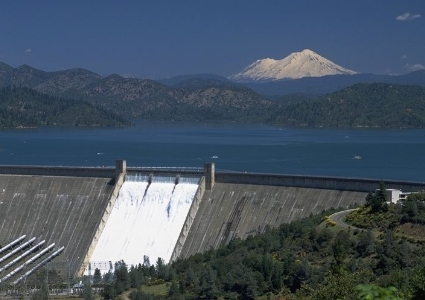Pledging
These are the original issues in this subcategory

You May Pledge Your Support For This Issue With A Monetary
Donation And By Writing A Letter To Your Representatives
- PEACEBUILDING
- FIRST RESPONDERS
- WATER SYSTEM SECURITY

There are 148,000 public water systems providing safe and clean water to nearly 329 million Americans. Disruption of these systems would likely bring the affected areas to a standstill, causing severe risks to health and safety as well as much economic loss. For this reason, our federal government provides some protection for these facilities. Since 9/11, the EPA has been developing new security technologies to detect and monitor water contaminants. Law enforcement has been working on preventing security breaches at the reservoirs and watersheds which supply our water systems. Security advocates say if contaminants can be detected early enough, they can be prevented from reaching consumers. If not, our water treatment plants must be able to quickly communicate warnings to their customers. In addition to intentional releases, our water supplies can also be contaminated by naturally occurring chemicals and minerals such as radon, uranium and arsenic. Contaminates from urban, factory, and farm pollution are threats as well.
However, advocates are most worried that our water systems may be vulnerable to sabotage. In 2014, Boston police arrested 7 nationals from Pakistan, Saudi Arabia and Singapore who were discovered trespassing one night at Quabbin Reservoir, the main source of water for Massachusetts. Some of these intruders had recently earned chemical engineering degrees, but were released after police found no wrongdoing. Although this incident did not pose a threat, it may indicate that those who wish us harm are aware of the vulnerability of our water systems.
Pending Legislation: S.660 - Water System Threat Preparedness and Resilience Act of 2023
Sponsor: Sen. Edward Markey (MA)
Status: Senate Committee on Environment and Public Works
Chair: Sen. Tom Carper (DE)
Tweet
However, advocates are most worried that our water systems may be vulnerable to sabotage. In 2014, Boston police arrested 7 nationals from Pakistan, Saudi Arabia and Singapore who were discovered trespassing one night at Quabbin Reservoir, the main source of water for Massachusetts. Some of these intruders had recently earned chemical engineering degrees, but were released after police found no wrongdoing. Although this incident did not pose a threat, it may indicate that those who wish us harm are aware of the vulnerability of our water systems.
Pending Legislation: S.660 - Water System Threat Preparedness and Resilience Act of 2023
Sponsor: Sen. Edward Markey (MA)
Status: Senate Committee on Environment and Public Works
Chair: Sen. Tom Carper (DE)
Tweet
- I oppose reforming current water system security policy and wish to donate resources to the campaign committee of Leader Charles Schumer (NY).
- I support requiring the Environmental Protection Agency (EPA) to create a program to support increased membership and involvement of certain smaller water utilities and water treatment works (e.g., wastewater systems) in the Water Information Sharing and Analysis Center. (WaterISAC is a group of water and wastewater systems that coordinate with the EPA and other federal agencies to collect and analyze data on water security and threats. WaterISAC also provides analysis and resources to support response, mitigation, and resilience initiatives.) Under the bill, the EPA must develop a program to: 1.) Encourage and support WaterISAC membership by community water systems (e.g., public water systems that regularly serve at least 25 year-round residents) and water treatment works. 2.) Offset membership dues for community water systems and water treatment works. 3.) Cooperate and coordinate with WaterISAC to expand incident data collection and analysis of threats related to the water sector. 4.) Enhance WaterISAC's tools and resources for monitoring the water sector and increase the preparedness of community water systems and publicly owned water treatment works to identify and respond to malevolent acts or natural hazards. And wish to donate resources to the campaign committee of Sen. Tom Carper (DE) and/or to an advocate group currently working with this issue.
- I support requiring the Environmental Protection Agency (EPA) to create a program to support increased membership and involvement of certain smaller water utilities and water treatment works (e.g., wastewater systems) in the Water Information Sharing and Analysis Center.
(WaterISAC is a group of water and wastewater systems that coordinate with the EPA and other federal agencies to collect and analyze data on water security and threats. WaterISAC also provides analysis and resources to support response, mitigation, and resilience initiatives.) Under the bill, the EPA must develop a program to:
1.) Encourage and support WaterISAC membership by community water systems (e.g., public water systems that regularly serve at least 25 year-round residents) and water treatment works.
2.) Offset membership dues for community water systems and water treatment works.
3.) Cooperate and coordinate with WaterISAC to expand incident data collection and analysis of threats related to the water sector.
4.) Enhance WaterISAC's tools and resources for monitoring the water sector and increase the preparedness of community water systems and publicly owned water treatment works to identify and respond to malevolent acts or natural hazards.
And wish to donate resources to the campaign committee of Sen. Tom Carper (DE) and/or to an advocate group currently working with this issue.
Donation And By Writing A Letter To Your Representatives
Please login to pledge
Pledge Period - Opening Date
April 22, 2024
Pledge Period - Closing Date
April 28, 2024
Trustee Election - Begins
April 29, 2024
Suggest a worthy trustee for consideration before Day 16 of this presentation cycle. (Maximum 60 Characters)